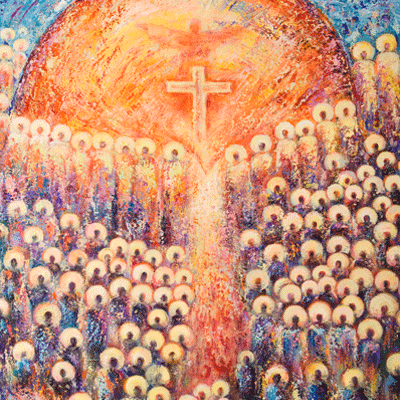 Seeing the crowds, Jesus went up the hill. There he sat down and was joined by his disciples. Then he began to speak. This is what he taught them:
Seeing the crowds, Jesus went up the hill. There he sat down and was joined by his disciples. Then he began to speak. This is what he taught them:
‘How happy are the poor in spirit: theirs is the kingdom of heaven.
Happy the gentle: they shall have the earth for their heritage.
Happy those who mourn: they shall be comforted.
Happy those who hunger and thirst for what is right: they shall be satisfied.
Happy the merciful: they shall have mercy shown them.
Happy the pure in heart: they shall see God.
Happy the peacemakers: they shall be called children of God.
Happy those who are persecuted in the cause of right: theirs is the kingdom of heaven.
‘Happy are you when people abuse you and persecute you and speak all kinds of calumny against you on my account.
Rejoice and be glad, for your reward will be great in heaven.’
(Matthew 5:1-12)
The Feast of All Saints has its origins in a 5th century feast of “All Martyrs”. In the 7th century, by which time the era of martyrdom had largely passed, it became “All Saints”.
In the Beatitudes, Matthew has transformed a short messianic manifesto into a program for life – a list of virtues which belong to those called into the Kingdom.
This is how people of the Kingdom live; these are the qualities which mark their lives.
The text is chosen for the Feast of All Saints for just that reason. We recognise in it the kind of life to which we are called. We recognise saints as those people who lived by these qualities – whether or not they are formally canonised by the Church.
The Feast of All Saints celebrates all those ‘saints’, including many we have known, who have entered fully into the Kingdom.
This Gospel is often used at funerals. Many people think this is because of the reference to ‘those who mourn’. But that is not why the Church lists it as appropriate for funerals. Funerals are about celebrating the life of those who lived according to the Gospel. That is what this Gospel is all about.
Today we also give thanks to God for all those saints who have shaped and influenced us in the way we live our Christian lives.
This traditional description of Christian living blesses those who live according to the great Christian virtues of humility, justice, righteousness, forgiveness, mercy and peace. This is the way into God’s eternal life here on earth and into eternal life with God - so, rejoice and be glad!
Join us in celebrating at home this Sunday using the links below.
Celebrating At Home for All Saints PDF
Celebrating At Home for All Saints EPUB














